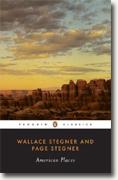American Places
Wallace Stegner & Page Stegner
book reviews:
· general fiction
· chick lit/romance
· sci-fi/fantasy
· graphic novels
· nonfiction
· audio books
· author interviews
· children's books @
curledupkids.com
· DVD reviews @
curledupdvd.com
newsletter
win books
buy online
links
home
for authors
& publishers
for reviewers

 |
American Places Wallace Stegner & Page Stegner Penguin Classics Paperback 304 pages July 2006 |
|
This country calls out for writers who love it but are clear-eyed in assessing where it is and where it seems to be going. An invaluable voice speaking of and for the land in both novels and prose (he died in 1993) was that of acclaimed writer/academic Wallace Stegner, whose fiction earned him a Pulitzer Prize and a National Book Award. His mark on the literary landscape was surely widened, too, by those he influenced while heading Stanford University’s creative writing program.
The matter of how the writings have held up - whether “dated and therefore of little interest beyond whatever literary merit they possess” - is addressed by Page Stegner in his preface. “The issue of land use and abuse in essays like ‘Crow Country’ or ‘High Plateaus’ may vary in particulars, but the problems are just as relevant in 2006 as they were in 1980,” he says. The reader’s question then becomes: what will be lost or degraded in the next 25 years? Of Wallace Stegner’s essays in the father-son melange my favorite is “Dead Heart of the West,” about Utah’s Great Salt Lake which he describes as “a desert of water in a desert of salt and mud and rock, one of the most desolate, and desolately beautiful of regions. Its sunsets, seen across water that reflects like polished metal, are incredible. Its colors are of a staring, chemical purity. The senses are rubbed raw by its moonlike horizons, its mirages, its parching air, its moody and changeful atmosphere.” The particular vividness of prose may stem from his substantial personal links with the state, where “when I was fourteen I sold hot dogs and hamburgers at Saltair, the resort built on pilings at the lake’s south end.” In the following essay, “Crow Country,” he described having spent “part of my youth backed up against . . . the Wasatch in Utah, and it taught me the feel of safety.” He speculates that the ability to “tuck back in against mountains” was surely prized by native Americans: “The Nez Perces and Flatheads and Shoshones, mountain Indians, must have felt a great easing of watchfulness when they got back from their annual buffalo hunt out on the plains.” Perhaps it’s because he had less history to look back on and to compare with the era (1980s) he was experiencing, but some Page Stegner segments read as less deeply felt compared with Stegner pere’s. One - his venture into a low dive frequented by loggers deep in the California redwoods - comes across as screen-playish. Something of a turn-off, too, is a tinge of 1980s “attitude,” particularly self-referentiality. His manner of introducing himself – in his persona as prep school rebel in thrall to nicotine - seems tiredly Holden Caulfield-ish when read in 2006. By far the best of the younger Stegner’s ruminations is set post-trip and in his own milieu of Santa Cruz, California. “I settled here in the first place,” he says, “because it was still possible, in the 1960s, to entertain the illusion of living with, and off, the land. After an hour’s argument with a creative writing class at the university about the ‘relevance of language in post-modernist society’ I could go home and feed the chicken and pigs.” And speaking of language, I was surprised to find three glaring spelling errors in Page Stegner’s brief new introduction to this re-issue. Has post-modern segued to post-meticulous? Originally published on Curled Up With A Good Book at www.curledup.com. © Norma J. Shattuck, 2006 |
|
|
|
 Click here to learn more about this month's sponsor! |
|
| fiction · sf/f · comic books · nonfiction · audio newsletter · free book contest · buy books online review index · links · · authors & publishers reviewers |
|
| site by ELBO Computing Resources, Inc. | |
 American Places was published in 1981 and re-issued this year with a new preface by his son and ’81 collaborator, Page, also a writer/academic who honed other writers in the program he directed at University of California, Santa Cruz. The joint effort centers on reflections gained from regional road trips undertaken, separately, by father and son
Added insights arise out of generational differences in their perceptions, prose styles, and even travel modes. It’s a cautionary reminder, too, of just how much many of the nation’s marvels of place have changed in the mere quarter-century since the Stegner road trips reaped material for the book.
American Places was published in 1981 and re-issued this year with a new preface by his son and ’81 collaborator, Page, also a writer/academic who honed other writers in the program he directed at University of California, Santa Cruz. The joint effort centers on reflections gained from regional road trips undertaken, separately, by father and son
Added insights arise out of generational differences in their perceptions, prose styles, and even travel modes. It’s a cautionary reminder, too, of just how much many of the nation’s marvels of place have changed in the mere quarter-century since the Stegner road trips reaped material for the book.